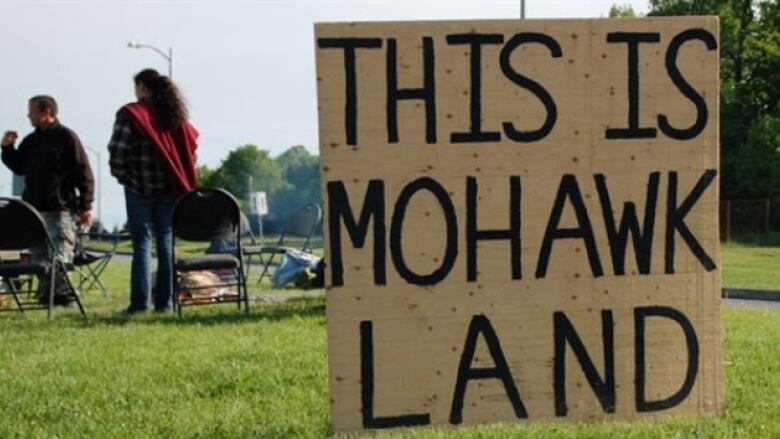'Short-sighted' new Kahnawake law excludes Mohawks adopting non-indigenous children
How should adopting and raising child as Onkwehn:we be even remotely negative, asks Steve Bonspiel

If a Mohawk couple adopts a child who is not indigenous, the adoptive parentshavecommitted an "offence,"according to a new law inKahnawake, Que.
Those same parents, who sacrificed, changed their livesand reached out to make something so delicate as an adoption happen, will pay for that decision dearly, according to a new amendment to the Kahnawake membership law.
The adoptive parents will lose their rights as Kahnawake Mohawks which include voting here, living here, being buried here.
How, exactly, is it an offenceto have compassion for a human being, let alone one so vulnerable?
How should adopting and then raising that child as an Onkwehn:we an indigenous personbe even remotely negative?
Why must we explore questions like these, which push us backwards, in 2016?
Sounds crazy, doesn't it?
But it happened a few weeks ago in a Community Decision-Making Process (CDMP) meeting in Kahnawake, where roughly 30 people decided it was the right thing to do to "protect the bloodline" a phrase used by many over the years.The CDMP writes the membership laws for Kahnawake.
There's a huge outcry on social media, Facebook especially.
Even many Kahnawake Mohawks who firmly agreed with the unwritten "marry out, get out," decree that resulted in attempted evictions of non-aboriginal residents in 2014are appalled.
- Kahnawake mixed couple subject of 'marry out, stay out' protest
- OPINION:Marry out, move out: Member of Mohawk Council of Kahnaw:ke speaks out
This isthe official wording of the latest version of themembership law, under the adoption section, article 14.7, made public bythe Kahnawake Legislative Coordinating Commission:
"A child who has no Kanien'kehka (Mohawk) or Onkwehonwe lineage adopted by a Kanien'kehka of Kahnaw:ke parent(s) after the enactment of this law on November 10, 2003 is not eligible to be recognized as a Kanien'kehka of Kahnaw:ke or be an Approved Kahnaw:ke Resident and, therefore, the parent(s) who chose to commit this offense will have their recognition (as a Kanien'kehka of Kahnaw:ke) suspended and not be eligible to reside in the territory of Kahnaw:ke."
Who has that right to say an offencehas been committed through such a selfless act?
Adults targeting children simply because they aren't of Mohawk heritage certainly gobeyond the path our ancestors chose.
This article dishonours their spirit and further distances us from whowe once were, as proud indigenous peoplesconnected to the land, respectful of everything and everyone around us.
Famous Mohawks with zero Mohawk blood
Adoption is what we built our communities on. Our ancestors didn't think about "protecting the blood," because they knew that if you were born Mohawk, you died Mohawk, no matter what anyone said.
And in many cases, even if you weren't born Mohawk, you could become one further strengthening our might and bolstering our numbers.
Some of the proudest Mohawks in our history were people who were adopted as full members of the nation, but who had zero Mohawk blood in them.
In 1704, during an even more tumultuous time than we face now, seven-year-oldEunice Williams, born English, was captured and adopted into the Mohawk Nation in Kahnawake. She was given the Mohawk name A'ongonte, which means, "She has been planted as a person."
She was quickly accepted and treated as a Mohawk for the rest of her life, and many here are descended directly from her bloodline.
Louis Cook isone of the most famous adopted Mohawks. His father was black and his mother Abenaki, and he was accepted into the Mohawk community because he fought beside the Mohawks. He fought in many wars and worked his way up to the rank of lieutenant colonel in the Continental Army during the American Revolution the highest rank by an indigenous person in the military.
The Tarbell boys, John and Zechariah, were among the first people to help establish the community of Akwesasne, at the St. Regis Mission.
Captured at 12 and seven, respectively, in 1707, they were considered important parts of the community, especially once they reached adulthood.
Later attempts by their English relatives to welcome them back failed, as they had learned to speak Mohawk fluently, knew the culture, tradition and ways of lifeand were not interested in goingback to the lives they were born into.
Adoption part of Mohawk identity
Adoption, quite frankly, is woven into the fabric ofthe Mohawk identity.
We are living, breathing examples of what Mohawk people look and act like in the 21st century because of our extensive history of adoption leading up to today.
The few dozen community members present at that meeting on March 8, 2016made an enormous decision for all of the more than6,500 registered Kahnawake Mohawks.
Now we are faced with the cold, hard reality that this horrific example of so-called democracy, of the "people's voice," is now "law" in Kahnawake.
At fault here is not only the short-sightedness of people whose decision affects the rights of others without human empathy orconsideration of the Mohawk tradition of adoption, but also the CDMP itself.
The CDMP was created by the Mohawk Council of Kahnawakeas a way tohear from the whole community.
However,when you regularly get 25 people hashing out what your future will look like, complete with personal bias and an abject failure to consider fullythe future of other people, you get something like this so-called law.
If "thinning the blood line" is such a concern for the ones who say we can be bred out through intermarriage and "mixing," the people who claim the adoption of a non-indigenouschild is an "offence" under the membership law need to examine how thin that line is between humanity and insanity.
Corrections
- A previous version of this article stated that a new Kahnawake law excludes Mohawks who adopt non-Mohawk children.Mar 24, 2016 9:29 PM ET












_(720p).jpg)


 OFFICIAL HD MUSIC VIDEO.jpg)
.jpg)



























































































